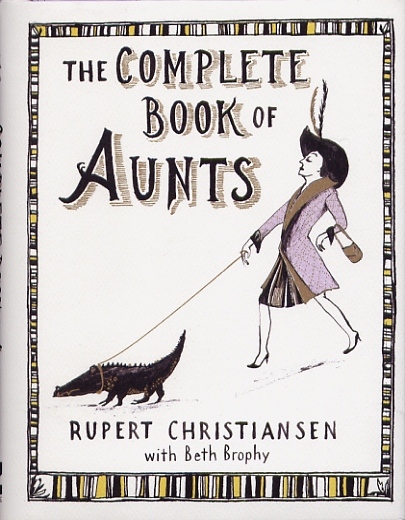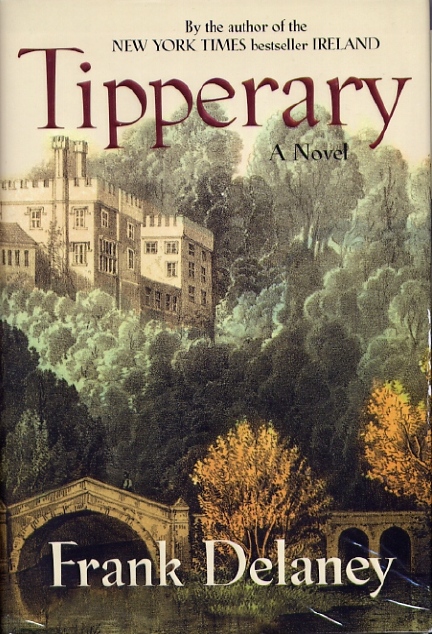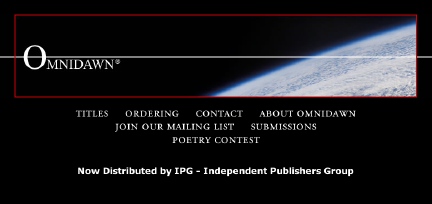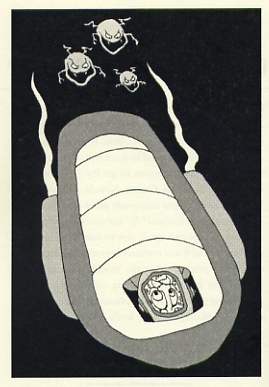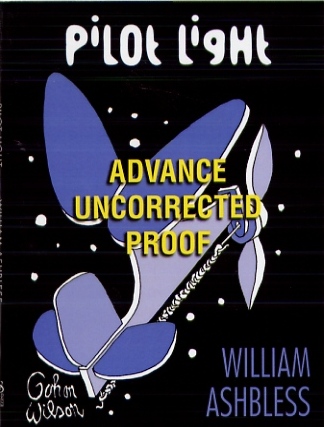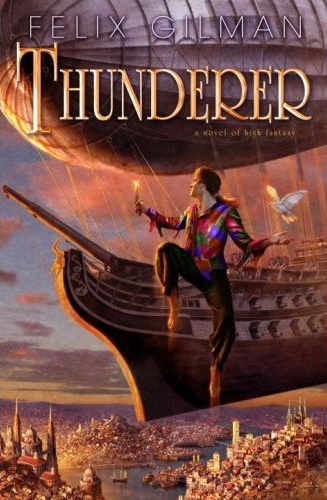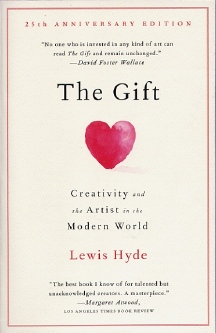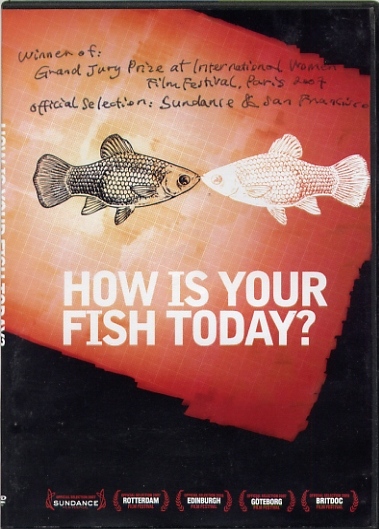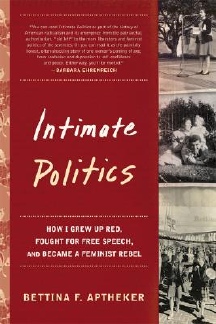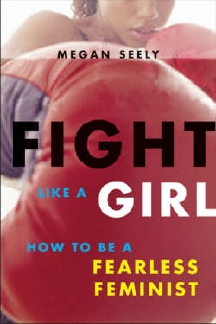|
|
|
|
This Just In...News
From The Agony Column
|
| |
|
12-14-07: Rupert Christiansen Relates 'The Complete Book of Aunts' ; Agony Column Podcast News Report : Pete Atkins Reads The King of Outer Space
|
Everything You Need to Aunt
|
|
Walking
the pet alligator.
|
How could I resist 'The Complete Book of Aunts' (12 Books ' October 16,
2007 ; $19.99) by Rupert Christiansen with Beth
Brody? Frankly, I could
not and snagged it from the shelves at KUSP immediately upon seeing it,
brought it home and it's been keeping warm on the Rolling Shelves for
that chilly day that apparently arrived at 4:30 AM this morning, when
I went to the car and found the windshield iced over for the first time
this year. Clearly this was a signal that I was to write about this delightful
book that veers far outside my normal territory. That's what attracted
me; that title on, the bookshelf.
But a title only gets you so far; a book has to deliver, and in this
case what must be delivered are Aunts, in all shapes, sizes and for all
sensibilities.
Christiansen and Brophy manage to do so with just the right amount of style
and grace and yes, the right sort of humor. You certainly don’t want
to laugh at aunts; that would be bad form. But there's something inherently
humorous in a book about Aunts, and the authors strike the perfect tone
for genteel, entertaining reading. The prose is pitch-perfect.
Of course, a book about Aunts must be organized and organized well. 'The
Complete Book of Aunts' measures up. We start off with A History of Aunts,
the most surprising aspect of which is how much history passes before Aunts
become an item. I would have thought that with all the begats and begets,
the Bible would have strayed into Aunt territory, but that's not the case.
No you have to wait until Nero, raised by an Aunt who clearly proved to
be a bad influence, and to a certain extent prescient, since the talent
of fiddling while Rome burns seems to be in demand here in the 21st century.
From there, the authors look at the bewildering variety of Aunts, from
those who are mothers to their own nephews thanks to the wonders of modern
science to Heroic Aunts, Brand Name Aunts and even, delightfully X-Rated
Aunts. Damned Bad Aunts from Mrs. Reed of 'Jane Eyre' to Charlotte and
Augusta, aunts to Hector and Ethel Munro, are ever enjoyable so long as
they’re not yours. Charlotte ("known as Tom") and Augusta "mistrusted
fresh air, and the atmosphere was further poisoned by the two women's mutual
loathing and ceaseless bickering." Ethel recalls that she and Hector "often
longed for revenge" and Hector acquired the alias Saki, under which
he wrote a series of stories in which Aunts nearly as unpleasant as his
met fates much more so.
I have to make special mention of Agony Aunts; I'm not one and never shall
be, but if the photo of Dr. Ruth doesn't frighten you into a shivering
mound of terror, then clearly, you have no feelings left.
But I know this not to be the case; my readers are full of feelings, most
of which at the current moment are along the lines of "What has gotten
into Rick Kleffel?" I can tell you precisely. I found a funny, slightly
snarky, smart book about Aunts. Not a book to end the world, but a fine
book. Of course, some might indeed feel that the publication of a book
including photos of both Agony Aunt Ruth Westheimer and Aunt Jemima is
indeed a harbinger of the Apocalypse. I wouldn't argue; in fact, I might
see if I have time to sign up for fiddle lessons.
|
Agony Column Podcast News Report : Pete Atkins Reads The King of Outer
Space
Today's podcast
is something I should have rescued from the vaults long ago, but; here
it is, an early Christmas present for the listeners, Pete
Atkins reading his story "The King of Outer Space". Atkins is
a brilliant writer and reader. With Glen Hirshberg, he performs as part
of the ROlling Darkness Revue. Prepare to be glued to your chair, stuck
in your car, continue your run – make
sure you allot 22 full minutes, because once you start you won’t
be able to stop. Prepare
to lift off!
|
| |
|
12-13-07: Frank Delaney Visits 'Tipperary' ; Agony Column
Podcast News Report : Agony Column Podcast News Report : A Conversation
With Rusty Morrison
|
Irish Epic
|
|
I
love this type of illustration, even if it is sort of cheesy.
|
When I first saw
'Ireland' by Frank Delaney, it was hard to let it go. I like a fat
historical novel now and again, and this looked to have
the right density and correct length to provide that go-somewhere-else
immersive experience. When I learned that Delaney would be visiting Capitola
Book Café, I put in my order and now I'm well into 'Tipperary'
(Random House ; November 6, 2007 ; $26.95). No need to turn up the furnace
on chilly evenings. This novel is just overheated enough to warm the
coldest hands, and charming enough to hang around in for nice winter's
week.
"Be careful about me," Charles O'Brien, one of the novel's narrators
tells us. It's easy enough to be wary of this garrulous storyteller. The
tone is hardwood rich and shiny, the prose warm enough to bring a light
sweat to the unprepared brow. O'Brien is an Irish Everyman, an understated
and overwritten hero. But he's the one telling the story, and it's hard
not to both like a believe him. He's not a firebrand, but a well-spoken
gentleman who is just outside the forces that swarm through early 20th
century Ireland. He's confident, not overly so, and the sort of man who
ends up meeting the likes of Oscar Wilde, William Butler Yeats and George
Bernard Shaw. He's pretty sure you're going to like him, but manages to
avoid being smug. Delaney's prose is perfectly pitched here, with the combination
of formality and intimacy that the character and the events demand. This
is not to say that some readers won't find O'Brien a little over-the-top.
But the flow is fast and complicated and full of choice details. It's easy
to let go.
And that's when you meet another man, a man of our time who has found O'Brien's
manuscript and serves it up to us, interspersed with his commentary. That's
the time when this reader starts to really perk up, because the presence
of two narrators so well balanced and placed against one another, suggests
a plot and creates a tension beyond the wide-open non-confining confines
of O'Brien's pixilated life story. We're hearing that story for a reason
that is compelling to an equally literate yet more demure storyteller.
Give yourself a chance and you'll be swept away.
Moreover, you're going to learn a lot about a slab of history you may or
may not be familiar with. I'm the latter, so getting to learn the details
and big stories that shaped Ireland is a pretty big bang for me. Delaney
does a great job of filling in the timeline without too much obvious lecturing.
And when the lecture come – oh yes, they come all right – well,
that's what you signed up for, innit?
Delaney has one essential quality that keeps him above the fray, a sense
of wonder that would not bee out of place in a science fiction or fantasy
novel. Of course, these days, lots of fantasies are little more than imagined
histories; this is history imagined anew, and has a similar feel. Ireland
is a land of imagination and magic; Delaney is both careful and able to
capture it with the kind of prose that you can almost hear him reading
aloud.
You may or may not think you like this sort of book. And Delaney, as O'Brien,
knows this. He plays his hand carefully, fully, sometimes even flamboyantly.
He smiles. You smile. It's a big fat life out there and in there. What
you realize as you read 'Tipperary' is that your life is just as full,
just as complex. And that somebody probably needs to be careful about you.
|
Agony Column Podcast News Report : A Conversation With Rusty Morrison :
Greeting the Omnidawn
I just got off
the phone with Rusty Morrisson, who, with Ken
Keegan, created Omnidawn
Publishing. We talked about just how and why you go about creating
a small press, from the community of poetry to the stacks of book covers
waiting to go on re-prints. This is a riveting and fascinating look at
the nuts-and-bolts mechanics of the publishing industry from the ground
up, the reason why we are the land of the free, etc. You
can hear the MP3 from this link, and damn if this won’t make you want to buy and then
start publishing poetry – well at least we have a great HOWTO start
your own publishing company on file.
|
| |
|
12-12-07: Tim Powers and James Blaylock Shine a 'Pilot Light'
on William Ashbless ; Agony Column Podcast News Report : A Conversation
With Felix Gilman
|
HAVE YOU SEEN THIS MAN?
This is the best
look we're going to get at William Ashbless. Now, I don’t
if any of you have ever visited the hellhole suburb of Hawaiian Gardens
where Ashbless claims to reside in 'Pilot Light' (Subterranean Press ;
November 2007 ; $20/$45), but I have and I can assure you that it is certainly
not in the least bit Hawaiian and that any gardens you might find would
be most likely to be sprouting broken beer bottles and greasy fast food
wrappers. The so-called "fact" that Ashbless would claim to live
in such a place suggests that he's not fully versed in what the rest of
the human race calls the truth. Of course, that's only the first layer
of the onion that is William Ashbless.
As for onions, well, he seems to have something of a problem with them.
Like his fellow science-fiction / genius literary author Jeff
Lint, Ashbless
has enough quirks to fill a book much larger than this one, but he's something
of a no-show at his own party. Instead, we have a hilariously incoherent
story gussied up with footnotes whose word count probably exceeds that
of the story. Yes, it's true. Ashbless does claim that he submitted this
story "back in the day" to Harlan Ellison for 'Dangerous Visions',
but if he did, he only could have done so with the hopes of making Ellison's
head explode. There's some evidence that might have happened. But I can't
divulge my sources.
|
|
Uncorrected?
How could anyone figure out what's correct?
|
I can state with certainty that Tim Powers' name appears
at the bottom of an introduction to this long-delayed appearance of a clearly
classic
exercise in transcribing the thoughts of those who have ingested far too
many controlled substances for their own good. And James Blaylock can
barely wait to drag Jacques Derrida into this torrid dialogue between an
author
and his own story. Yes, Ashbless annotates himself, but not to death, no
matter how much Blaylock and Powers might hope that to be the case. They
seem to take every opportunity to mention his death and shortly afterwards,
their disc over that he is still alive. Since I was under the mistaken
impression that he was a contemporary of William Blake, you can bet I was
surprised to find him living in Hawaiian Gardens. Gahan Wilson has taken
on the arduous of illustrating the fermented fruits of Ashbless' imagination.
He must have owed Bill Schafer over at Subterranean Press big-time. You
can bet that even the man brave enough to publish Ashbless isn’t
spared in those voluminous footnotes. No, here's an author who feels perfectly
free to bite the hands that feeds him.
A review of this book is to a certain extent spurious. You know if you
need it and should that be the case, you’d best get a move-on. Somewhere
out there a neglected genius is coughing up things only he would dare to
describe. Pay the man, lest he ask to borrow your car.
|
Agony Column Podcast
News Report : A Conversation With Felix Gilman : Thunderer and Mervyn
Peake
|
|
Somewhere
out there is a castle named Gormenghast.
|
Today, I'm podcasting a conversation I had with Felix Gilman about
his novel 'Thunderer!' and the influence of Mervyn Peake in modern fantasy.
You can grab the MP3
from this link, and the novel should be out there
soon. I suspect that a lot of readers will enjoy it greatly.
|
| |
|
12-11-07: Lewis Hyde Offers 'The Gift' ; Agony Column Podcast
News Report : NPR Story Author Writes First Book in New Language
|
Threads and Themes
|
|
Taking
on the vampire economy.
|
There's a hunger
at large in this world, a desire that touches nearly all. Surrounded
as we are by art, by the fruits of creative imagination, we
cannot help but be touched ourselves. We don’t just want to experience
art. We want to experience creating art.
But the mechanics of the marketplace of art are such that it's simply
not possible to sell all that art. I remember one USENET wag named Kibo
who,
back in the heyday of USENET news groups, predicted that someday there
would be a news group for every person on the planet. These days the response
might be, "Only one?" But instead we have websites for just about
every person on the planet and quite a few devoted to humans and other
critters that will never exist. We have indeed achieved Stanislaw Lem's
Pericalypse, a glut of art and information that makes it impossible to
find the good.
But who cares about the good? What about those of us who do the mediocre?
Where's the reward for that? The star-dumb, the prophets? Huh? What makes
creation rewarding? Back
when I talked to Jonathan Lethem, he mentioned
a book by one Lewis Hyde titled 'The Gift: Creativity and the Artist in
the Modern World' (Vintage Books / Random House ; December 4, 2007 ; $14.95),
which has just been released in a "25th Anniversary Edition" splattered
with blurbs from the likes of Lethem and David Foster Wallace. It's kind
of ironic, really, all those blurbs and the hoopla to sell a book that
might be seen as highlighting the virtues of not getting sold.
In his new preface, Hyde talks about how books are sold, essentially on
a one-sentence pitch. "Any current list of bestsellers will provide
a sample of the genre: "Extraordinary conclusions about the lineage
of Christ." "Newspaper columnist learns life lessons from his
neurotic dog." "How the dead communicate with us." "Reporter
exposes a ring of vampires out to take over Seattle." "Memoir
by the bad-boy golf champion."" His book, he says is not so amenable
to summary. It's point is to be non-summarizable. Hyde wanted to explore
an idea about the process of creation, a why and wherefore for the artists
who are not super-stars putting their names on book-blurbs. That would
be the other 99.99999% of humanity. Somebody has to be the audience.
This ties into another thread brought
up by Michael Krasny in his excellent
memoir 'Off Mike'. Krasny wanted to be an artist – a writer, to be
precise – but had to wade through a fair portion of his life before
he managed to write out the bildungsroman of his own life story. His book
is something of an inspiration to would-be writers, an audience I'm trying
to address with those NPR Reports on writers who have published their first
book. Or, not so much would-be writers, but rather, those who simply write
or do stuff regardless of what they do with it afterwards.
All these threads lead quite nicely to Hyde's book-long meditation on the
place of creativity in the capitalist society. It's not such an easy relationship.
Hyde believes that, "in the essential commerce of art a gift is carried
from the artist to his audience." This does not bode well for those
who would convert art into cold-hard-cash commerce. Hyde's a great writer,
who uses evocative stories and fables to complicate his point and create
a sort of pixilated understanding of his vision. The effect for the reader
is that of having an intelligent discussion with someone who cares passionately
not just about art but about all creativity. This is a powerful work about
why we do create and why we should create and how should experience creativity
in all its forms. Suffice it to say that those who are interested in Digital
Rights Management and the current Copy Fight wars will find much fodder
for reasonable discourse. Not that reasonable discourse is supposed to
have a large appeal in the so-called "marketplace of ideas." Hyde
writes the sort of book that will blow your mind, slowly.
This isn’t the only book of Hyde's I've read. Back in the before-time,
I read and reviewed his book 'Trickster Makes This World' for the Fortean
Times. As you might suspect, I found it quite an enjoyable and thought
provoking examination of the Trickster myths; and even Michael Chabon refers
to it in the 'Astonishing Stories' intro.
And even though Hyde states that 'The Gift' is not amenable to the one-line
summary, he gives one anyway, which might suggest why this book is seen
as essential by the
likes of Lethem. "And if the salesmen want to pitch the book as "Bad-boy
critic takes on vampire economy," that's all right with me," Hyde
says.
So, another one on the to-be-read, stack, right? Teetering, is it? That's
a good sign!
|
Agony Column Podcast News Report : NPR Story Author Writes First Book in
New Language : Xiaolu Guo Film News
|
|
| Award
winning and yet very strange. We like very strange. |
Today's podcast is a high-quality DRMless
MP3 of my most recent article
for NPR, a piece about how Xiaolu Guo came to write her first book in English.
You've got all the raw material I used if you downloaded the original interview.
Xiaolu sent me copies of How Is Your Fish Today?, The Concrete
Revolution,
and a short new film, Address Unknown. They all showcase the same intelligence,
wit and charm that made 'A
Concise Chinese-English Dictionary for Lovers'
such a delight. As well, they show some of the same stylistic grace the
novel shows, in terms of mixing documentary styles with fictional tales. How
Is Your Fish Today? is a very Borgesian movie, a creamy meditation
that renders reality more plastic than is usual. The Concrete Revolution is in fact a documentary about the price being paid for the "New China".
Address Unknown is a sort of complement to her novel; the novel as if seen
looking the wrong direction through a telescope. Readers lucky enough to
be in Rotterdam in January can see her latest movie, We Went to Wonderland;
while UK readers can pick up the translation of her first novel in Chinese,
'20 Fragments of a Ravenous Youth' in January as well. Xiaolu has a powerful,
fascinating voice, with a bent to the surreal. It sounds like life, especially
the surreal aspects. Those threads and themes; first books, creativity,
the gift of art, the way everything seems to weave seamlessly from one
theme to the next.
|
| |
|
12-10-07: A 2007 Interview With Bettina Aptheker and Megan Seely ; NPR Report on Xiaolu Guo
|
The Personal and the Political
|
|
|
History
and HOWTO change it. |
History has the
power to move, to inspire, to bring forth passion in our lives. But
you have
to find it, you have to read it, you have to
hear it, to somehow get it into your mind first. And the problem is that
there are lots of histories and stories out there with the power to inspire
that you might not ever happen to hear or read. Fortunately, the documents,
the lives, the voices remain. In this case, the voices of Bettina
Aptheker,
author of 'Intimate Politics: How I Grew Up Red, Fought For Free Speech
and Became a Feminist Rebel' (Seal Press ; September 5, 2006 ; $16.95)
and Megan Seely, author of 'Fight Like a Girl: How to Be a Fearless Feminist'
(NYU Press ; January 7, 2007 ; $17.95). I was fortunate enough to have
the opportunity to speak with both of them at the Capitola Book Café before
they appeared last week, and I have to say that it was intense and yet,
really relaxed and fun. These ladies didn't just use the F-word; they
defined it.
The F-word in this case being "Feminism". But there's a lot
more going on here. Bettina Aptheker is a genuine historical figure,
and her story as it unfolds in 'Intimate Politics' is a remarkable summation
of the struggles of the 20th century that brought us to the 21st. She
was the daughter of a famous American Communist party leader, Herbert
Aptheker, and a prestigious "red diaper baby." The people she
talks about having in her house, the things she's done are simply mind-boggling.
I'm going to let her tell the story, but it's riveting look at everything
from the McCarthy hearing to the Angela Davis trial to the 21st century.
Megan Seely calls herself a "third wave feminist," one who
ha benefited fro the struggles of Aptheker, Her book, 'Fight Like a Girl'
and great HOWTO not just for feminist activists, but for anyone who ants
to get out and support the cause of justice of any stripe. She writes
with the same clarity you'll hear when she speaks. Speaking with both
of them and hearing them interact was totally entertaining, because they're
both light-hearted, but also very moving, because they both have lived
serious lives and have remarkable accomplishments. And better still,
they’re both funny. They laugh and you will as well. Here's
a link to my MP3 of the interview with them, and here's
a link to the RealAudio file. Make a point of listening to them, and hear stories you just can't
hear anywhere else. Is that not the goal, the essence of reading?
|
First Book, New Language
|
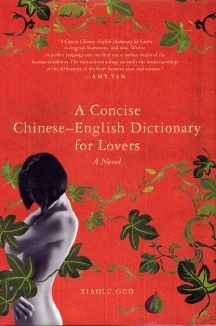
|
A
passionate writer.
|
I'm posting this very
early because I want readers and listeners to have a chance to listen
to my upcoming story on Weekend Edition Sunday. Now
there's always the possibility that it won't air this week, given some
kind of news event. But I am told that if you listen to Weekend Edition
Sunday, my report will run in the last half of the first hour, just after
the Puzzle Master Presents with Will Shortz. This time, the piece is
on Xiaolu Guo, whose first novel in English is 'A
Concise Chinese-English Dictionary for Lovers'.
It's a great novel and I hope an entertaining
report, mostly because Xiaolu has such a wonderful voice, both in timbre
and by virtue of what she says. You can hear the passion in her voice;
and you can find the entire interview here. As ever, I shall upload a
high-quality MP3 version of the report in the fullness of time, but in
the interim, I'd ask readers to listen up when it runs live, and then
return here, or just
go to NPR where you can find the web page for the story. Use the "Email this story" button early and often. That
will suggest to NPR that they ought to keep running my reports which
go directly to support this website and interviews like the one above
as well as that with Xiaolu.
|
| |
|
|
